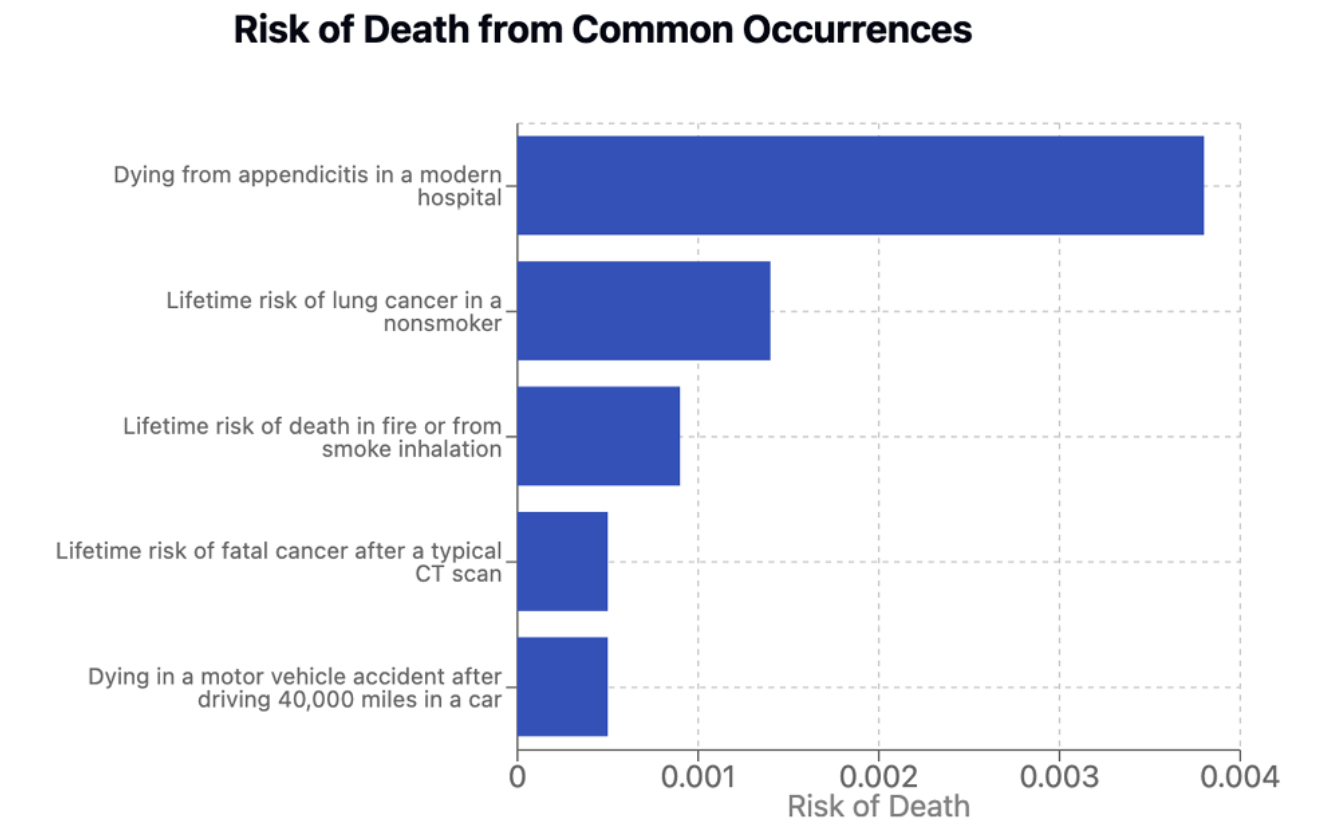
What Is a CT Scan?
A CT (Computed Tomography) scan is a special kind of X-ray examination that takes detailed pictures of the inside of your body. Doctors use these images to find out what’s wrong, treat problems, and see how treatments are working.
CT Scans and Cancer Risk: What You Should Know
You might have seen news stories saying that CT scans could raise your risk of cancer. While it’s true that CT scans use radiation, these stories don’t always tell the full story and can cause unnecessary worry.
If your doctor recommends a CT scan, it’s because it can help find or treat something serious. The chance of harm from the scan is very small, and doctors work hard to keep it that way.
Talk to your doctor if you’re worried. But remember: not getting a needed scan can be riskier than having one.
This guide will help you understand the real benefits of CT scans, the small possible risks, and how doctors work to keep you safe.
Why CT Scans Are Important
- Find Problems Early – Like cancer, when it’s easiest to treat
- Handle Emergencies – Like strokes, internal bleeding, or appendicitis
- Plan Cancer Treatment – By showing where the cancer is and how it’s reacting to treatment
- Avoid Surgery – Sometimes a CT scan means surgery isn’t needed
- Guide Treatments – Like helping doctors place needles or tubes in the right spot
- Get Faster Answers – So you can start treatment sooner
Are CT Scans Dangerous?
CT scans do use a small amount of radiation. A recent study tried to estimate how this might affect cancer risk in the future, but it used math models based on data predominantly from a different population exposed to a different type of radiation — not real cases of cancer.
Here are some important facts:
- There has never been a proven case of someone getting cancer from a CT scan.
- Studies estimating cancer risk from CT radiation use data from different people exposed to different radiation (like atomic bomb survivors).
- The way these studies estimate CT radiation may not match how CT scans work today, since modern machines use much less radiation.
Radiation Risk in Perspective
Medical procedures and tests have both risks and benefits. We need to weigh these carefully. News stories often talk about radiation dangers (risks), but these tests also help patients in important ways (benefits).
Another way to think about risk is to focus on what probably won't happen. For example, if there's a one in 2,000 chance of getting cancer from a procedure, that means you have a 99.95% chance of not getting cancer.
If you need a CT scan:
- The benefit of finding or treating a serious health problem is much greater than the tiny, possible risk of cancer.
- Not getting a scan when you need one can be far more dangerous than the small possible risks of CT radiation.
- CT scans today use the lowest radiation dose possible to get clear images.

What Radiologists Do to Keep You Safe
Radiologists are doctors who specialize in reading a patient’s images. They make sure CT scans are safe and useful. They:
- Use the lowest radiation levels that still give clear results (called ALARA: As Low As Reasonably Achievable)
- Keep improving scan settings to use less radiation
- Follow strict rules about when scans should be done
- Work with your doctor to choose the best type of scan for your situation
- Recommend other tests (like MRI or ultrasound) when they can be used instead
Common Questions
Should I be worried about having a CT scan?
Not if your doctor recommends it. The benefits of finding out what’s wrong almost always outweighs the small possible risks. Modern CT scanners are designed to use as little radiation as possible.
Are there other options besides a CT scan?
Sometimes, doctors can use tests like ultrasound or MRI. But those tests don’t work for every condition. Your doctor and radiologist will choose what’s best for you.
What are doctors doing to lower radiation exposure?
They use special tools and settings to use less radiation, adjust for your size and age, and check each scan to make sure it’s really needed.
How do I know if I really need a CT scan?
Ask your doctor:
- Why do I need this test?
- Are there other tests that could work instead?
- How will this scan help my treatment?
Are there other resources I can review to better understand CT scans, their benefits, and their risks?
Yes, here are some helpful online resources:
Reviewed April 25, 2025